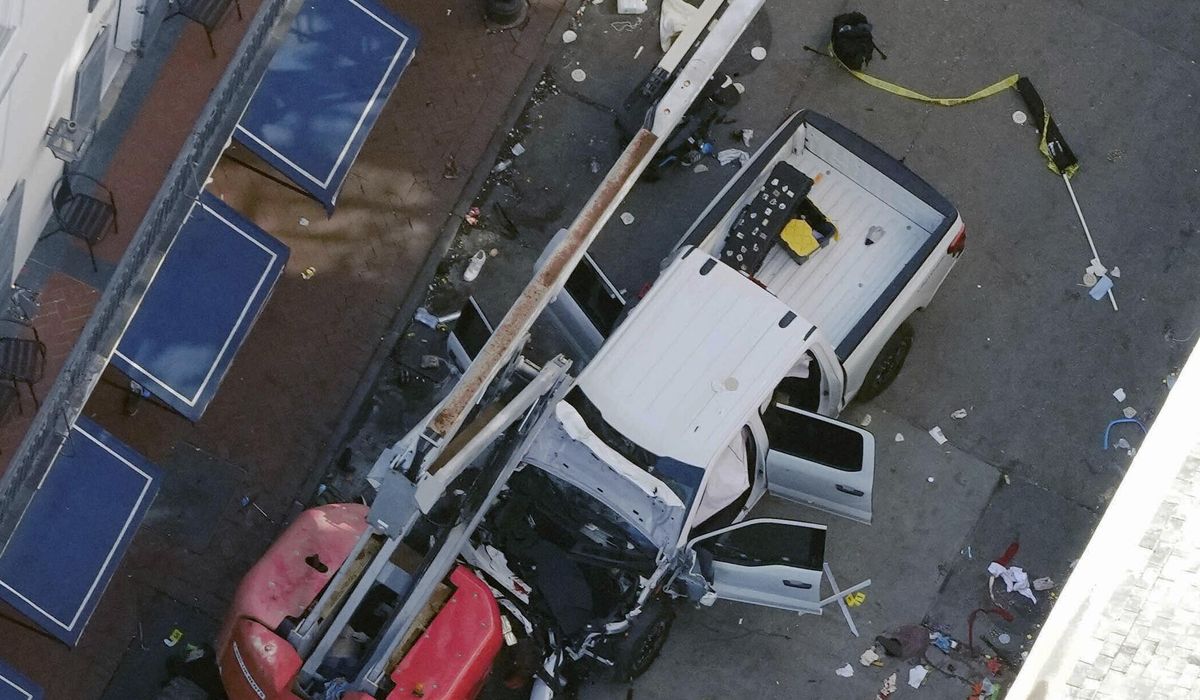


National security defenses are in a “state of disrepair,” and the rapid rise in extremist cases across the U.S. underscores the vulnerabilities of the homeland, House Republicans warned in a major report.
The Homeland Security Committee’s “Terror Threat Snapshot,” shared exclusively with The Washington Times before its public release Wednesday, offers a chilling breakdown of the jihadi dangers. The document also outlines the extent of domestic security challenges confronting President Trump and his team.
The release is especially timely after the killings of 14 people in a shocking New Year’s Day attack in New Orleans. Authorities said Islamic State-inspired Shamsud-Din Jabbar, an Army veteran living in Houston, drove a vehicle into a crowd along Bourbon Street.
The report details more than 50 jihadi cases in 30 states over the past four years. Most of those cases involved attempts to provide material support to terrorist groups such as ISIS, Hezbollah and al Qaeda. Unlike Jabbar, who was not stopped before the attack, most others were prevented from carrying out their plans.
“The New Orleans terrorist attack was a stark reminder that the terror threat to America is alive and persistent,” Homeland Security Committee Chairman Mark Green, Tennessee Republican, said in a statement accompanying the report.
“Emboldened by the national security blunders of the past four years, foreign terrorist organizations and jihadist networks abroad remain committed to recruiting and radicalizing individuals on U.S. soil,” he said. “Make no mistake: All of the lights are still blinking red. As we remember and honor the 14 lives lost at the hands of terrorism on New Year’s Day, we must also renew our commitment to securing the homeland.”
DOCUMENT: Terror Threat Snapshot
Mr. Trump is taking executive actions to bolster security at U.S. borders with Canada and Mexico. Preventing extremists from entering the country through either of those borders is one of his top priorities.
Other reasons for concern include the collapse of Syrian leader Bashar Assad’s government late last year. The ascendance of an untested rebel alliance in Damascus has opened the door for a potential resurgence of ISIS in Syria and perhaps across the broader Middle East. That resurgence could drive terrorist attacks against the U.S. homeland and interests abroad.
In Afghanistan, the absence of American forces has paved the way for the growth of ISIS-K, an affiliate of the Islamic State group. Terrorist outfits are on the rise across Africa. Hamas, Hezbollah and Yemen’s Houthi forces, although weakened by U.S. and Israeli military campaigns over the past 12 months, remain threats in their own right.
Europe has had 187 terrorist-related attacks, plots or arrests since the beginning of 2023, the House report said.
House Republicans say the situation is bleak, though they have renewed hope that the Trump administration will quickly address domestic vulnerabilities.
“There is no question that our national security is in a state of disrepair after the past four years of failed leadership,” said Rep. August Pfluger, Texas Republican and chairman of the House Homeland Security subcommittee on counterterrorism and intelligence.
“Americans have been the target of terror at public celebrations, and ISIS and al Qaeda are emboldened in the Middle East, North Africa and Southeast Asia,” he said. “There is immense work to do to correct course and bolster our homeland security. That work begins now.”
Jabbar’s has become the most high-profile extremist case in the U.S., but more than 50 others include the September arrest of Asif Merchant, a Pakistani national with ties to Iran who was charged in an alleged murder-for-hire plot thought to be targeting Mr. Trump.
This month, a federal grand jury indicted Jack Danaher Molloy, 24, formerly of Pittsburgh, on charges of attempting to support Hezbollah. In November, Anas Said, 28, of Houston, was indicted on charges of trying to provide material support to the Islamic State.
• Ben Wolfgang can be reached at bwolfgang@washingtontimes.com.
